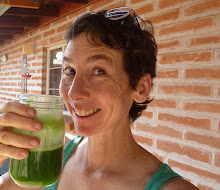It happened a long time ago, in an arid land of sand and Pharoahs.
There was a tribe of people who spoke Hebrew. We call them the Hebrews; I don't know what they called themselves. Perhaps their name for themselves was something like, the People, for many tribal peoples consider themselves to be 'the People' or 'the Ones'.
This is not a story composed from precise history. Rather, it has been pieced together from stories and lessons I have heard from childhood and into my life now.
A few years ago, at a gathering with a story-telling rabbi in Tucson, I was treated to a new version of the story of matzoh. What is matzoh? Matzoh is the unleavened bread that the Hebrews ate while they fled to the Promised Land. What is the Promised Land? Read on.
This arid land of the Pharoahs was a place we currently know as Egypt. The Hebrews, we are told, were forced into hard physical labor for many many years, persecuted continually, and made to flee from place to place, only to flee again. It was not fun. And, in the Land of the Pharoahs, the mean Pharoahs shackled the People and made them slaves.
One day, an elder of the tribe named Moses declared it was time to leave. They had to leave immediately, he told them, NOW! There would be no time to prepare in their usual way, no time to let the bread rise before baking it, and, in fact, they would have to wander a while--God knows how long or where to.
So, the People heeded Moses' decision, for they respected his wisdom and guidance. Plus, he was a holy man. We all know what happened next. The Red Sea parted for them. Why? Because they trusted Moses' words and they believed they were embarking on a trip to the Promised Land. They knew it was time to unshackle themselves; it was time to flee. They walked, wandered, and ate matzoh, that unleavened bread we relegate to the seder ritual, once a year at Passover.
People are skeptical about miracles these days--miracles are not "scientific," we say; we want proof. We believe miracles happen to other people, not to us, and we believe that scriptural stories are mere myths. These myths, however, are meant to be lived by each of us. It was for good reason that Joseph Campbell titled one of his books as Myths to Live by; there are universal myths that we humans live out, each in our particular way.
The ritual of eating matzoh during Passover is one thing; bringing the essence of the ritual into one's life is another. This matzoh story is about the latter.
Rituals, words of wisdom we read and hear, and sacred teachings are all meant to be experienced.
The meaning/moral of this story?
There may not be time to allow the dough to rise for bread.
If life requires you to walk into the wilderness now, walk now.
Even with crackers instead of bread.
Trust that the seas will part.
Life is full of little miracles--right here--in the wilderness.
The Holy man and woman is alive inside of us. Heed his/her voice.
If you do, you might wander for forty years in the desert, but you will be living your myth, and, you will have a matzoh story (or two or three) to hand down to your People.
And, the teachings will have daily life application.
In the matzoh story of the Jews (the Hebrews), the big, bad Pharoahs actually helped get the People moving. Thus, sometimes what (or who) we label as 'bad' (our persecutors) turns out to be 'good' for us and vice versa.
When it is time to leave a situation or to make a change because you are being 'persecuted', do it now. Take your matzoh with you. Matzoh (the present moment) will sustain you; the Red Sea will really part.
And, don't forget to thank your persecutors.
* * * * * * *
A ship in harbor is safe,
but that is not what ships are built for.
[John A. Shedd, Salt from My Attic, 1928]
Sunday, December 04, 2005
Subscribe to:
Post Comments (Atom)


2 comments:
i LOVE HAOW YOU TOLD THE STORY OF HAVEING OT LEAVE NOW AND WANDER IN DESERT. tHANK YOU NICOLE.
KATHY
Glad to read this two years later, Nicole, it's a fine piece and I couldn't agree more that our "persecutors" are our benefactors.
Warm regards,
Carol
Post a Comment